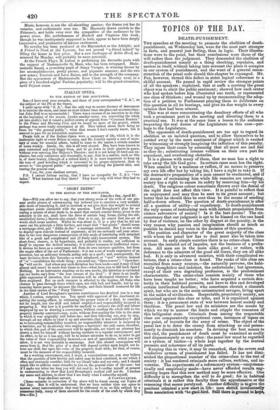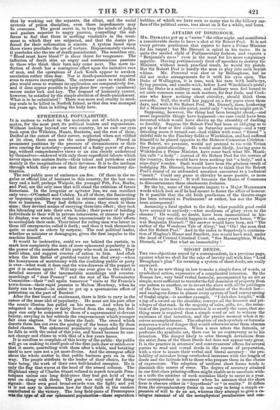TOPICS OF THE DAY.
DEATH-PUNISHMENT.
THE speeches at the meeting to promote the abolition of death- punishment, on Wednesday last, were for the most part stronger in facts, and general just feeling, than in logic. Their illustra- tions were to the point, but their conclusions were those of the will rather than the judgment. They demanded the abolition of death-punishment simply as a thing shocking, repulsive, and useless in itself, without taking into account the place it occupies in our system of punishment, and the want of a general recon- struction of the penal code should this chapter be expunged. Mr. Fox, however, turned this defect in strict logical coherence to a skilful account. He passed in rapid review the stronger points of all the speakers ; explained, that at sudh a meeting the great object was to elicit the public sentiment; showed how each orator who had spoken before him illustrated one truth, or represented one class of thinkers ; and wound up by recommending the adop- tion of a petition to Parliament praying them to deliberate on this question in all its bearinr,as, and give its due weight to every opinion that had been uttered.
This was at once concentrating the desultory efforts of all who took a prominent part in the meeting and directing them to a practical use. It was at the same time a lesson to the audience respecting the real duties of the Legislature in this case—per- haps to the Legislature.
The opponents of death-punishment are too apt to regard its abolition as an isolated question, and to allow themselves to be carried away by the mere sentiment of disgust which is excited by witnessing or strongly imagining the infliction of this penalty. They injure °their cause by assuming that all must see and feel as they do ; substituting intense volition on their own part for argument, and overlooking obstacles.
It is a phrase with many of them, that no man has a right to
take away the life God gave. In certain cases man has the right. When assailed by a madman or ruffian, if no means to preserve my own life offer but by taking his, I have a right to take it. If the destructive propensities of a man cannot be eradicated, and if all means of restraining him while life remains are unavaihng, society has a right to assure its safety by removing him—by his death. The religious colour sometimes thrown over the denial of the right does not affect this view. It is painful to reflect that an unprepared soul may thus be sent to its great account ; but better that he should thus be sent than be the means of sending, half-a-dozen others.. The question of death-punishment, is after all a question of utility—of expediency. Is death-punishment the only means of restraining men with certain propensities from crimes subversive of society? Li it the best means? The cir- cumstance that our judgment is apt to be biassed on the one hand by fear of violence, on the other by disgust at the penalty, is the very reason why passion and imagination should as much as possible be denied any voice in the decision of this question.
The position and character of the great majority of the class
with whom the penal law has to deal must also be taken into account. In early simple societies there is no crime-class. Crime is there the isolated act of impulse, not the business of a profes- sion. All men are in the main alike good ; or rather, with deference to the admirers of the good old times, they are all alike bad. It is only in advanced societies, with their complicated re-. lations, that a crime-class is found. The ranks of this class are recruited from many sources,—the naturally perverse, the habi- tually thoughtless and indolent, the unfortunate ; but ignorance, except of their own degrading profession, is the predominant characteristic. The crime-class consists mainly of those who have been taught no better; who have acquired a certain dex- terity in their habitual pursuits, and have to this end developed certain intellectual faculties ; who sometimes cherish a clannish spirit, but who are in the main uninstructed savages, living apart in the midst of civilization. Respectable, proprietary society, are organized against this class or tribe, and it is organized against them : it is a permanent state of war between honest society and thiefdom. The penal law and its ministers are the means by which we try to narrow the limits and cripple the resources of this belligerent state. Criminals from among the respectable class are comparatively exceptional cases, instances of lapses on one point, of recruits for the army of crime. The object of the penal law is to deter the enemy from attacking us and perma- nently to diminish his numbers. In devising the best means to this end, the punishment of death must be examined as coolly and dispassionately as any other: the penal law must be regarded as a system of tactics—a whole kept together by the mutual pressure and coherence of all its parts. Keeping this in view, it may be remarked, that the severe and vindictive system of punishment has failed. It has not dimi- nished the proportional number of the crime-class to the rest of society : it has rendered criminals more callous, reckless, and in- veterate. The experiments of a reformatory system—unsystema- tically and empirically made—have never afforded results sug- gesting hopes that this new method may be more effective. One difficulty is to strengthen the will to do good; for in habitual criminals it is rather this faculty than the apprehensive or the reasoning that seems paralyzed. Another difficulty is to give the penitent criminal a new start in life : men shrink involuntarily from association with tbe gaol-bird. Still there is ground to hope, that by working out the separate, the silent, and the social systems of prison discipline, even these impediments may be overcome. The great secret is, to keep the minds of judges and gaolers superior to angry passion, compelling the suf- ferers to feel that there is nothing vindictive in the treat- ment to which they are subjected, and that the desire pro- fessed for their reformation is sincere. A system based upon these views precludes the use of torture. Dispassionately viewed, it precludes also the use of death-punishment. The senseless cry, "Blood must have blood 1" is sheer thirst for vengeance. The infliction of death stirs up angry and contumacious passions in those who think their turn may come next. The mere in- fliction of death has a contagious effect upon the imitative race of man, and the operations of Jack Ketch appear to awaken emulation rather than fear. Nor is death-punishment required even to remove incorrigibles. The extreme cases to which this plea would seem to warrant its application are comparatively few, and it does appear possible to keep these few enrages (madmen) secure under lock and key. The demand of humanity cannot, however' be satisfied by the simple abolition of death-punishment. What is to be substituted? There was more real cruelty in send- ing souls to be killed in Norfolk Island, as that den was managed ten years ago, than in killing the body here.



















































 Previous page
Previous page